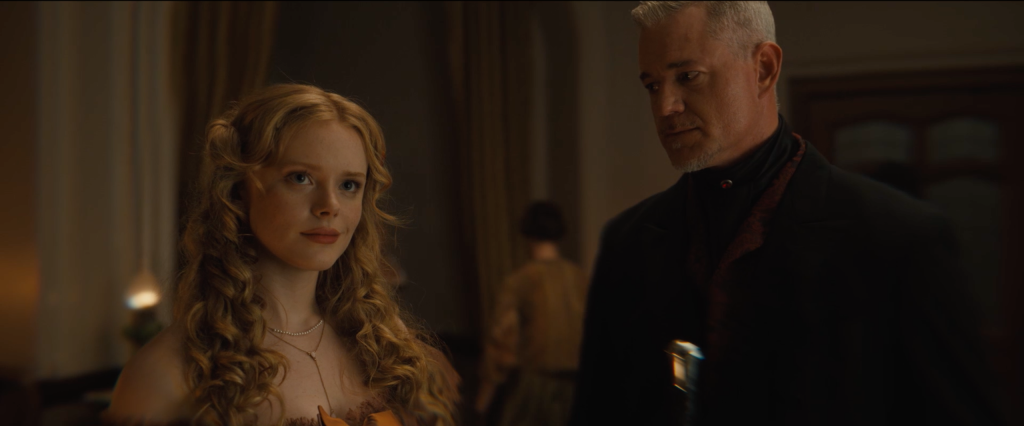February 13, 2022
by Carla Hay

Directed by Adam Salky
Culture Representation: Taking place in the fictional U.S. town of Corallis, the dramatic film “Intrusion” features a predominantly white cast of characters (with one person of Indian heritage and a few African Americans) representing the working-class and middle-class.
Culture Clash: After a married couple experiences a terrifying and deadly home invasion, the wife begins her own investigation into why this break-in happened.
Culture Audience: “Intrusion” will appeal mainly to people who are interested in mystery thrillers that follow a predictable formula and have too many moments of ridiculousness to be considered high-quality entertainment.

“Intrusion” is a mystery crime drama that’s so lazy and mediocre, it’s too easy to figure out who’s the chief villain, long before the movie is over. The only memorable things about “Intrusion” are some of the ludicrous and unbelievable scenes that some viewers might consider unintentionally funny. The film’s climactic showdown scene permanently sinks “Intrusion” into the cesspool where vapid and generic thrillers are quickly forgotten.
Directed by Adam Salky, “Intrusion” has very little flair, wit or charisma. And that includes the non-existent chemistry between Freida Pinto and Logan Marshall-Green, who play the married couple at the center of the story: Meera Parsons and Henry Parsons. Meera (who’s a therapist) and Henry (who’s an architect) have been married to each other for 12 years. They have recently moved into their dream home that Henry built for Meera.
The house is in a fictional American small town called Corallis, which has a mix of working-class and middle-class people. Moving to a small town is quite an adjustment for this couple. Meera, who is originally from India, met Henry when they used to live in Boston. Meera and Henry have also had a big challenge in their marriage: Meera is recovering from breast cancer, which is currently in remission.
One evening, shortly after moving into their new house, Meera and Henry have dinner together at a nearby restaurant. When they come home, they immediately see that their living room and study have been ransacked. When an investigating cop named Detective Steven Morse (played by Robert John Burke) shows up to take the crime report, Henry tells him that two cell phones and a laptop computer were stolen from the home. Detective Morse remarks that if Henry designed the house himself, then Henry should’ve also installed a security system.
Not long after the break-in, Meera has an appointment with her oncologist Dr. Burke (played by Denielle Fisher Johnson), who has some good news for Meera: The test results came back for a lump that Meera felt on one of her breasts, and the lump was scar tissue, not cancer that returned. Dr. Burke can see how Meera’s cancer recovery has been taking a toll on Meera’s emotional well-being, so she recommends that Meera see a therapist, but Meera dismisses this advice. She tells the doctor that her husband Henry provides all the emotional support that she needs.
Dr. Burke also mentions that she heard about the break-in, and she’s concerned this invasive crime might cause extra stress for Meera, who is very surprised that Dr. Burke knows about the break-in. “It’s a small town,” Dr. Burke explains. Meera will soon find out that there’s a lot she has to learn about Corallis.
Trust and uncovering secrets are recurring themes in “Intrusion.” Meera had made her appointment with Dr. Burke without telling Henry. And when Henry finds out about it, he gets annoyed, and he lectures Meera about how they shouldn’t keep secrets from each other. They have a little tiff over this issue, but it’s not an argument that causes a big rift in their relationship.
Meera’s and Henry’s lives change forever one night, when three intruders break into their home—and not everyone makes it out alive. The first sign that something is wrong is when there’s an electrical power outage in the home. Henry checks the power generator outside, and he sees that it has been deliberately damaged. When he goes back in the house, he’s shocked to find that Meera has been tied up by intruders, who are not in the room.
Henry quickly unties Meera. He gets a gun and fights off the intruders, who are three other men, and they have an attack dog with them. Meanwhile, Meera jumps from a second-floor balcony to go outside to her car to try to escape. She hears gunshots coming from inside the house. And the next thing you know, one of the men appears in front of her with the dog, but he’s shot and immediately killed by Henry.
It’s later revealed that Henry also shot the two other intruders inside the house. Two of the intruders are now dead, while the other has survived and is in the local hospital’s intensive care unit. Who were these three intruders? They all come from the same family: Paul Cobb (played by Antonio Valles) and his younger brother Colby Cobb (played by Brandon Fierro), both in their 20s, are the ones who were shot dead. Their father Dylan Cobb (played by Mark Sivertsen) is the one who is severely injured in the hospital.
Because Corallis is a small town with a small police department, Detective Morse is on this home invasion case too. He tells Meera and Henry that the Cobbs are related to Christine Cobb, a freshman at a community college, who has been missing for several weeks. Christine is Dylan’s daughter and the sister of Paul and Colby. After the police investigate the crime scene and take statements from Meera and Henry, it’s determined that Henry acted in self-defense, so he’s not charged with any crimes.
As upsetting and traumatic as this home invasion was, Henry still wants to go ahead with the housewarming party that he and Meera had planned for the following evening. Meera is reluctant to have the party, but Henry insists that the best way to deal with the trauma is to not let it disrupt their lives. Even though Meera is grateful that Henry saved their lives, she’s upset that Henry secretly had a gun that she didn’t know about until this home invasion happened.
The police are investigating why Henry and Meera were targeted for these two break-ins, but the police investigation is not enough for Meera. She begins looking for clues on her own, starting with what she can find around the house when Henry isn’t home. Meera suddenly acts like a private detective when certain clues lead her to some of the seedier areas in town. It isn’t long before Meera does some trespassing and break-ins herself, in her growing obsession to find out the truth.
There’s a scene at a trailer park where Meera is confronted by a local lowlife named Clint Oxbow (played Clint Obenchain), who catches her snooping around. It’s an example of one of many scenes in “Intrusion” that will have viewers giggling or groaning at the absurdity of it all. The clues in this mystery lead to a very predictable answer. By the time the big reveal happens in a very clumsily written and poorly executed scene, a lot of viewers who already had the mystery figured out will probably be very unimpressed. The cast members give very average or subpar performances.
Between the too-obvious clues and the short list of possible suspects, “Intrusion” offers very little suspense. The movie might have risen above its mediocrity if the main characters were more engaging. Unfortunately, Meera and Henry are so boring and emotionally awkward as a couple, viewers will have a hard time believing that Meera and Henry are supposed to be each other’s best friend. “Intrusion” gives everything the “blah” treatment, including the marital relationship and the mystery that are supposed to be at the heart of the story.
Netflix premiered “Intrusion” on November 22, 2021.




